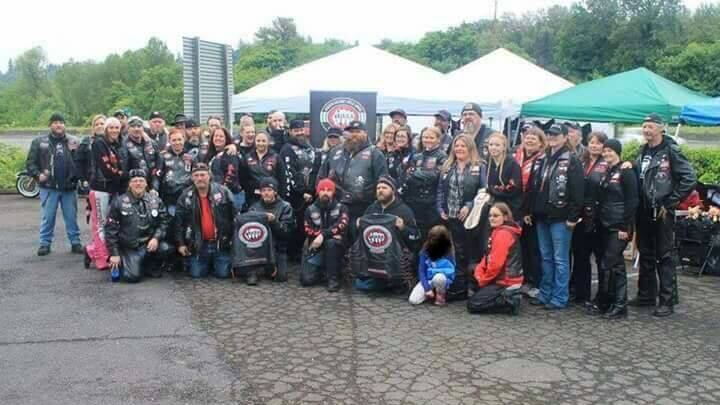Bikers are known for being an intimidating bunch. Sometimes that can be put to good use.
The nonprofit Bikers Against Child Abuse harnesses that badass reputation in support of a particularly vulnerable population: juvenile abuse victims. Testifying in court can be a traumatic experience for children, especially if they’re forced to face their assailant. The members of BACA volunteer to accompany them, to provide a boost of confidence and security.
“A lot of times, parents are either part of the case or a witness to the case, so they can’t be in the court with their children,” says DeVille, the mononymous president of BACA’s Mount Hood chapter. “That’s why, half the time, a child molester or abuser will get off, because [the child] is too scared to explain what happened. We go up in there, stand by [victims], and tell them, ‘It’s OK to do what you gotta do about your past.’”
DeVille founded the Mount Hood chapter, which serves the Portland metro area, in 2015. It’s now the largest in Oregon, with others covering the state’s rural and coastal areas. DeVille won’t disclose membership numbers but says the group has enough resources to meet the needs of Multnomah County and branch out when needed—in one extreme case, Mount Hood answered an Arizona chapter’s call for over 200 reinforcements to stand against Mafia threats.
Before the pandemic, BACA’s tough guys and bad babes would often hold a supportive biker rally at a child’s home, giving them a vest, road name, and two designated contacts they could reach out to as they went through court proceedings. In more difficult cases, bikers have kept watch outside the child’s home and paid for hotel and mental health services if necessary.
Though the coronavirus forced BACA to scale back its mission, the bikers are back on duty as courts reopen. DeVille says the county only recently started referring cases directly to them—a payoff of years of building trust with court workers.
“It takes a special person to do what we do,” DeVille says. “We don’t get paid for this. It’s a lot of work. But the payment is the smiles on these kids’ faces and the fact that they get to be kids again, and they don’t have to be afraid of the world in which they live anymore.”
Click below to see more Best of Portland 2020:

